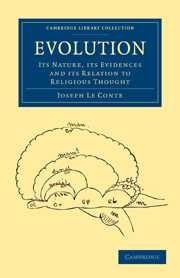Book contents
- Frontmatter
- PREFACE TO THE SECOND EDITION
- PREFACE TO THE FIRST EDITION
- Contents
- PART I WHAT IS EVOLUTION?
- PART II EVIDENCES OF THE TRUTH OF EVOLUTION
- PART III THE RELATION OF EVOLUTION TO RELIGIOUS THOUGHT
- CHAPTER I INTRODUCTORY
- CHAPTER II THE RELATION OF EVOLUTION TO MATERIALISM
- CHAPTER III THE RELATION OF GOD TO NATURE
- CHAPTER IV THE RELATION OF MAN TO NATURE
- CHAPTER V THE RELATION OF GOD TO MAN
- CHAPTER VI THE OBJECTION THAT THE ABOVE VIEW IMPLIES PANTHEISM, ANSWERED
- CHAPTER VII SOME LOGICAL CONSEQUENCES OF THE DOCTRINE OF THE DIVINE IMMANENCY
- CHAPTER VIII RELATION OF EVOLUTION TO THE IDEA OF THE CHRIST
- CHAPTER IX THE RELATION OF EVOLUTION TO THE PROBLEM OF EVIL
- Index
CHAPTER III - THE RELATION OF GOD TO NATURE
Published online by Cambridge University Press: 29 August 2010
- Frontmatter
- PREFACE TO THE SECOND EDITION
- PREFACE TO THE FIRST EDITION
- Contents
- PART I WHAT IS EVOLUTION?
- PART II EVIDENCES OF THE TRUTH OF EVOLUTION
- PART III THE RELATION OF EVOLUTION TO RELIGIOUS THOUGHT
- CHAPTER I INTRODUCTORY
- CHAPTER II THE RELATION OF EVOLUTION TO MATERIALISM
- CHAPTER III THE RELATION OF GOD TO NATURE
- CHAPTER IV THE RELATION OF MAN TO NATURE
- CHAPTER V THE RELATION OF GOD TO MAN
- CHAPTER VI THE OBJECTION THAT THE ABOVE VIEW IMPLIES PANTHEISM, ANSWERED
- CHAPTER VII SOME LOGICAL CONSEQUENCES OF THE DOCTRINE OF THE DIVINE IMMANENCY
- CHAPTER VIII RELATION OF EVOLUTION TO THE IDEA OF THE CHRIST
- CHAPTER IX THE RELATION OF EVOLUTION TO THE PROBLEM OF EVIL
- Index
Summary
We have already said that evolution does not differ essentially from other laws of Nature in its bearing on religious belief. It only reiterates and enforces with additional emphasis what Science, in all its departments, has been saying all along. The difficulties in the way of certain traditional views have pressed with ever increasing force upon the thoughtful mind ever since the birth of modern science. All along, an issue has been gathering, but put off from time to time by compromise, until now, at last, the issue is forced upon us and compromise is exhausted. The issue (let us look it squarely in the face) is: Either God is far more closely related with Nature, and operates it in a more direct way than we have recently been accustomed to think, or else (mark the alternative) Nature operates itself and needs no God at all. There is no middle ground tenable.
Let us trace rapidly the growth of this issue. The old idea and the most natural to the religious mind was the direct agency of God in every event and phenomenon of Nature. This view is nobly expressed in the noblest literature in the world—in the Hebrew and Christian Scriptures: “He looketh on the earth and it trembleth. He toucheth the hills and they smoke.” “He maketh his sun to rise on the evil and on the good, and sendeth his rain on the just and on the unjust.”
- Type
- Chapter
- Information
- EvolutionIts Nature, its Evidences and its Relation to Religious Thought, pp. 297 - 303Publisher: Cambridge University PressPrint publication year: 2009First published in: 1898

